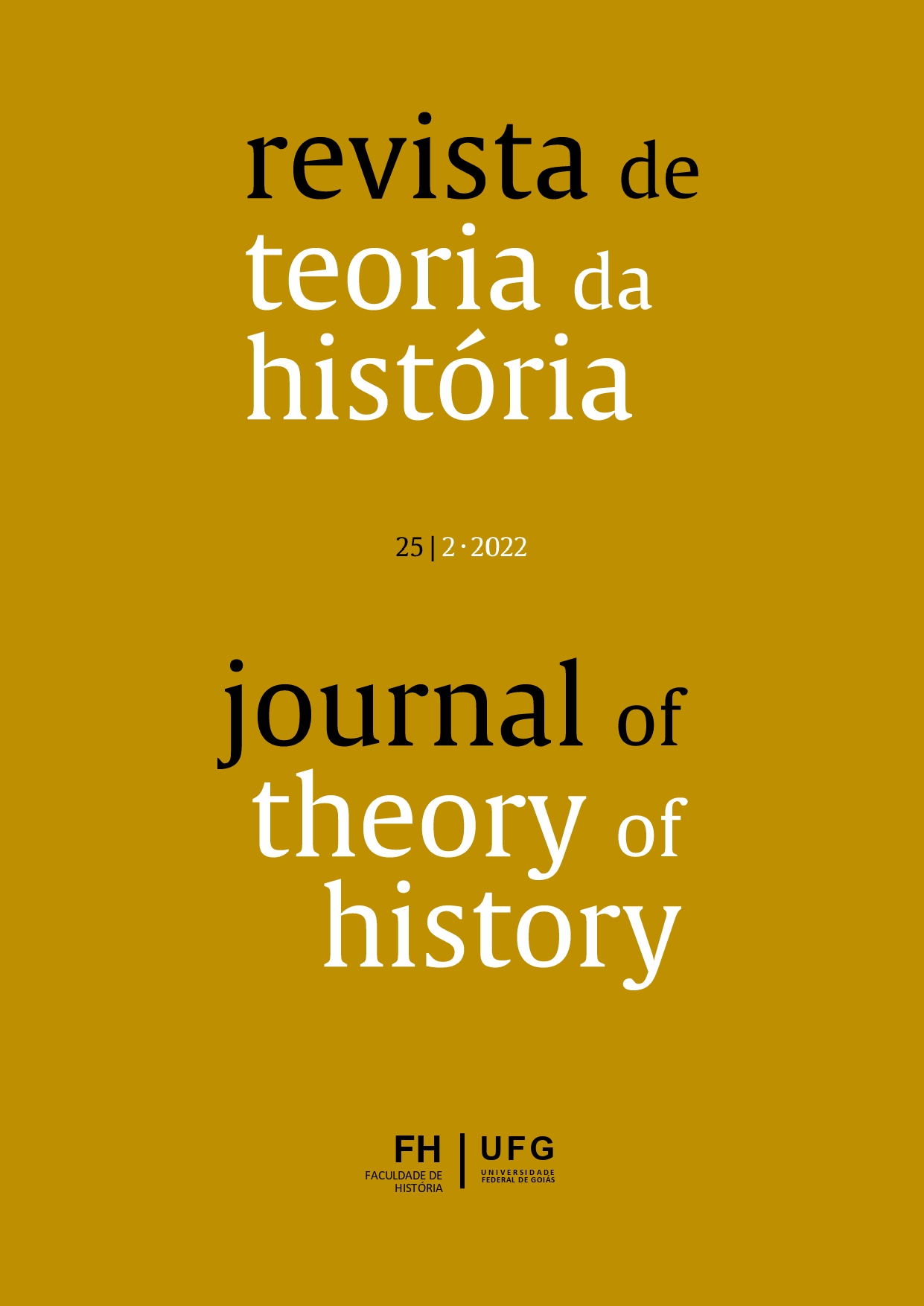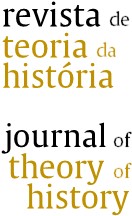Um profeta da velocidade
O caso de Ray Kurzweil e uma reflexão sobre a construção de uma filosofia profética da história
DOI:
https://doi.org/10.5216/rth.v25i2.73794Schlagworte:
Atualismo, Filosofia da História, Ray Kurzweil, Singularidade, TecnologiaAbstract
Esse artigo se propõe a buscar, na formação do imaginário da Inteligência Artificial dos anos 1990 e 2000, as razões sociais da construção do otimismo em relação ao futuro, com a hipótese de que disciplinas como a Inteligência Artificial lançam-se à esfera pública como produtoras de imagens de futuro poderosas o suficiente para que se tornem, na linguagem popular, um tipo de consciência histórica adequada ao neoliberalismo, examinando o caso exemplar de Raymond Kurzweil. Inicialmente, serão abordados alguns pressupostos da cultura sci-fi na qual se formam esses discursos. Depois, será dada uma atenção à discussão da importância da biografia do profeta, Kurzweil, na intenção de analisar a importância do tema do guru fundador, do profeta, na construção social do otimismo com a tecnologia junto com a nova ideia de personalidade. Em seguida, serão analisados, a partir dos pressupostos anteriores, as modalidades de consciência histórica que se propagam através deles: o agenciamento de si no futurismo, a questão da tecnologia e o tipo de relação entre destino histórico e destino individual. Nossa hipótese é que os futuristas não são os profetas do futurismo, mas do atualismo, e de que a construção e a fortuna pública desse imaginário tem como coluna espinhal a ideia de que a biografia de um indivíduo exemplar é nada menos do que uma reprodução em micro escala da biografia do mundo.
Literaturhinweise
BOLTANSKI, L. CHIAPELLO, E. The new spirit of capitalism. Ed. Verso. London, 2005.
BOURDIEU, P. 1997. Razones practicas. Sobre la teoria de la acción.. Editorial Anagrama, Barcelona, 1997.
CAHILL, D. COOPER, M. KONINGS, M. PRIMROSE, D. The SAGE Handbook of neoliberalism. SAGE Ed, 2018.
CASTELLS, M. HALL, P. Technopoles of the World: The making of twenty-first-century industrial complexes. New York. Ed. Routledge, 1994.
CREVIER, D. A la recherche de l´intelligence artificielle. Paris. Ed. Flammarion, 1997.
DARDOT, P. LAVAL, C. A nova razão do mundo. São Paulo. Ed. Boitempo, 2016.
DIÉGUEZ, A. Transhumanismo. La búsqueda tecnológica del mejoramiento humano. Herder Editorial, S.L., Barcelona, 2017.
EPOCA. Negócios. Singularity University prevê como o mundo será em 2038: "irreconhecível”. Disponível em https://epocanegocios.globo.com/
FELL, J. Heidegger and Sartre: an essay on Being and Place. New York: Columbia University Press, 1979.
GIRARD, R. Mentira romântica e verdade romanesca. Tradução de Lilia Ledon da Silva. São Paulo, SP: É Realizações, 2009.
GOLUMBIA, D. The cultural logic of the computation. Cambridge. Harvard Univeristy Press, 2009.
GROOT, J. Consuming History. Historians and heritage in contemporary popular culture. USA. Routledge, 2009.
GUMBRECHT, H. U. Nosso amplo presente: o tempo e a cultura contemporânea. Trad. Ana Isabel Soares. São Paulo: Editora da UNESP, 2015.
HARAWAY, D. Antropologia do ciborgue. As vertigens do pós humano. Belo Horizonte. Autêntica, 2009.
KEEN, A. The cult of the amateur: how today's internet is killing our culture. The Doubleday Broadway Publishing Group, 2007.
KEHL, M. R. Ressentimento. 5ª edição. São Paulo: Casa do Psicólogo, 2014.
KEHL, M. R. Melancolia e criação. Em: FREUD, Sigmund. Luto e melancolia. Tradução, introdução e notas de Marilene Carone.Textos de Maria Rita Kehl, Modesto Carone e Urania Tourinho Peres. São Paulo: Cosac Naify, 2011.
KOSELLECK, R. Estratos do tempo: estudos sobre história. Tradução Markus Hediger. - 1. ed. - Rio de Janeiro: Contraponto: PUC-Rio, 2014.
KUNDERA, M. A identidade. Tradução de Teresa Bulhões Carvalho da Fonseca. – São Paulo: Companhia das Letras, 2009.
KUNDERA, M. A imortalidade. Tradução de Teresa Bulhões Carvalho da Fonseca e Anna Lucia Moojen de Andrada. São Paulo: Círculo do Livro, 1998.
KUNZRU, H. Você é um ciborgue em HARAWAY, D. Antropologia do ciborgue. As vertigens do pós humano. Belo Horizonte. Autêntica, 2009.
KURZWEIL, R. A singularidade está próxima. Quando os humanos transcendem a biologia. Itaú Cultural / Illuminurias. São Paulo, 2018.
KURZERIL, R. A era das máquinas espirituais. São Paulo: Aleph, 2007.
KURZWEIL, R. How to create a mind. New York/Victoria. Viking. Penguin Group, 2012.
LASCH, C. A cultura do narcisismo. A vida americana numa era de esperanças em declínio. Rio de Janeiro: Ímago, 1983.
LATOUR, B. A esperança de Pandora. Ensaios sobre a realidade dos estudos científicos. Trad. Gilson C. C de Sousa. Bauru, SP: EDUSC, 2001.
LEWIS, M. The New New Thing : A Silicon Valley Story. New York, Norton & Company, 2000.
MACINTYRE, A. Depois da Virtude. Trad. Jussara. Simões. Bauru: EDUSC, 2001.
MIROWSKI, P. PLEHWE, D. The road from Mont Pèlerin: The making of the neoliberal thought collective. Harvard University Press, 2009.
NOBLE, D. Progress without people. New Technology, Unemployment and the message of resistance. Toronto. Between the lines, 1995.
PEREIRA, M. Lembrança do presente. Ensaios sobre a condição histórica na era da internet. Belo Horizonte. Autêntica, 2022.
PEREIRA, M., ARAUJO, V. Actualismo y presente amplio: breve análisis de las temporalidades contemporáneas. Desacatos. Revista de Antropología Social, v. 55, p. 12-27, set./dez. 2017
PEREIRA, M. ARAUJO, V. Atualismo: pandemia e historicidades no interminável 2020. Estudos Ibero-Americanos, Porto Alegre, v. 47, n. 1, p. 1-16, jan.-abr. 2021 | e-39802
PEREIRA, M.; ARAUJO, V. Atualismo 1.0 – Como a ideia de atualização mudou o século XXI. 1. ed. Ouro Preto: SBTHH, 2018.
RICOEUR, P. O si mesmo como outro. Tradução Ivone C. Benedetti. – 1ª ed. – São Paulo: Editora WMF Martins Fontes, 2014.
ROBINS, K. WEBSTER, F. The Technical Fix. Education, Computers and Industry. New York. St. Martin's Press, Inc., 1989.
SARTRE, J.-P. O existencialismo é um humanismo. Apresentação e notas, Arlete Elkaïm Sartre; Tradução de João Batista Kreuch. 4. ed. Petrópolis, RJ: Vozes, 2014.
SARTRE, J.-P.. O ser e o nada: ensaio de ontologia fenomenológica. 16 ed., tradução de Paulo Perdigão. – Petrópolis, RJ: Vozes, 2008.
SCHMIDT, E., & COHEN, J. The new digital age: reshaping the future of people, nations and business, 2013
SHAPIN, S. The scientific life: a modern history of a late modern vocation. Chicago: The University of Chicago Press, 2008.
SIMON, Z. A transformação do tempo histórico. Temporalidades processual e eventual. revista de teoria da história 24, 1, •2021, p. 139-155.
STARKS, M. Will Hominoids or androids destroy the Earth? A review of How toc reate a mind by Ray Kurzweril. Suicidal Utopian Delusions in the 21st Century -- Philosophy, Human Nature and the Collapse of Civilization-- Articles and Reviews 2006-2019 4th Edition Michael Starks. Las Vegas, NV USA: Reality Press. pp. 265-277 (2019)
STEIN, E. Órfãos de utopia: a melancolia da esquerda. – 3. ed. – Ijuí: Ed.Unijuí, 2015.
THIEL, P. De Zero a Um. O que aprender sobre empreendedorismo com o Vale do Silício. Ed. Objetiva. Rio de Janeiro, 2014.
Downloads
Veröffentlicht
Zitationsvorschlag
Ausgabe
Rubrik
Lizenz
Copyright (c) 2022 rth |

Dieses Werk steht unter der Lizenz Creative Commons Namensnennung - Nicht-kommerziell - Keine Bearbeitungen 4.0 International.
A Revista publica única e exclusivamente artigos inéditos. São reservados à Revista todos os direitos de veiculação e publicação dos artigos presentes no periódico.
Licensed under a Creative Commons Attribution-NonCommercial-NoDerivatives 4.0 International License



